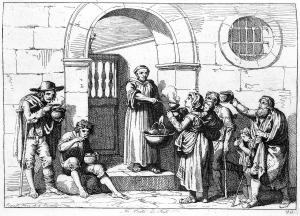
Jesus spoke out against the abuses of the rich and powerful while defending and promoting the poor and the outcast. In Luke, this is rather clear, as we see him giving blessings to the poor, while giving warnings (or curses) to the rich (cf. Lk. 6:20-26). His mission was to save the world, but that meant more than just preserving it as he found it, it meant he had to transform and reshape the world, righting the wrongs which those who lived in the world experienced. This is why social justice cannot be ignored, as the salvation of the world requires all that is unjust to be made just.
The greater the problem, the greater the injustice, the greater God is drawn to it to work for its reversal. Jesus and the prophets showed, the injustices experienced by the poor, the outcast, and those being oppressed by society experience graver injustices than many others, by the way they focused on those injustices. Christians should take this to heart and make sure their engagement with the world, the work they do to help continue Christ’s reversal of the injustices created by sin, must recognize the greater importance the needs of the poor, the outcast, and the oppressed over many others (which is why the church talks about the preferential option for the poor and the oppressed).
Sadly, this aspect of salvation, this aspect of Christ’s work, often has been obscured as the rich and powerful have found ways to have it marginalized. They knew if Christians paid attention to the preferential option for the poor as it is revealed in Scripture and tradition, they would risk losing the wealth and power they have accumulated for themselves. This is why James Cone was right in saying, “The Gospel will always be an offense to the rich and powerful, because it is the death of their riches and power.”[1] The rich and powerful, to be sure, like the general message of salvation, they like being told God loves them, and so many are attracted to the Christian faith, but they want to be saved with “cheap grace,” that is, without having to change. And because of this, they have brought about in society a truncated or pseudo-Christianity, one which borrows Christian truths, but subverts them, making it seem like all one has to do is have some sort of intellectual assent to the teachings of the faith to be saved, fighting any expectation of transformation as being a “gospel of works.” But, if Christian paid attention to Jesus, not the rich and powerful, they would note that social justice is a major part of Christ’s message, and Christ clearly wanted his followers to embrace it for themselves.
Sin brings about social injustice. The rich and powerful, or those who would like to be rich and powerful, exploit the system to keep or gain dominance over others, using wealth and the power it brings to achieve their goal. But Jesus warned us we cannot follow Mammon and truly be one of his disciples. We must make a choice between Christ, and his way, the way of love and justice, or the way of Mammon (and the laws Mammon would impose upon the world). This does not mean we cannot be wealthy, but if we are, we are expected to use our wealth for the promotion of the common good, making sure we use our wealth to confront the structures of sin established by Mammon, to counter, that is, the evils associated with wealth with wealth itself.
The plan of salvation, the teaching of the Gospel, is radical, because it takes on, uncovers, and then overcomes sin and the injustices which flow from it. “From the outset, the Gospels wish to convey that the Jesus story is not simply a story about a good man who met an unfortunate fate. Rather, in Jesus God is at work, telling his story and disclosing the divine plan of salvation.”[2] The story of salvation is the story of how God comes within the world, empties himself of all apparently glory out of love for the world, so that those who are oppressed by sin and the injustices it creates, can be and will be comforted as God confronts the structures of sin and works to bring them to an end. God, surprisingly, does it by becoming, as it were, weak (in the incarnation), so that in and through that weakness, God engages the powerful and overcomes their power, destroying their domination and control over the fate of the world. The God-man, thus, joins in solidarity with all those who are weakened by sin, those who suffer injustice at the hands of the rich and powerful. Through the bond between God and the world created by the incarnation, those who were weak find themselves energized and strengthened by Christ, so that with the grace they receive, they can and should join in with Christ’s work to overcome the structures of sin in the world and the various systems which create them. Father Ippolito Desideri, a missionary to Tibet, explained this in the following way:
I will add that the Christ would not have had to submit to his painful Passion and death on the cross, as he did, to overcome the Devil in that way – that is, to completely disarm him and to restrict his power within very strict limits. To achieve that, it would have been sufficient to take back the general permission given to him from the beginning of the world to injure human beings, and for that only a gesture from his Divine Omnipotence would have been enough; nothing else would have been necessary. All of the sufferings that Christ bore in the course of his most holy life were well employed, and the shedding of his divine blood was well spent, because his victory over the Devil had to consist in fortifying weak human beings against him. Therefore, all of the pains and sufferings of the Man-God were not in vain, as they made it possible for a more miserable man to triumph over such a powerful adversary.[3]
There are many kinds of structures of sin which have been made, each which must be fought against and overcome, with the greatest and worst being the spiritual structures which try to imprison the whole of creation, forcing everything and everyone in it to be slaves to sin. But, many of the most significant structures of sin, the most imperative to deal with, are those which establish temporal injustice, for temporal injustices weaken the spirit and often cause people to despair, a despair which then hinder their spiritual transformation. If we are to confront sin, if we are to work with Christ to bring an end to sin in the world, we must work with him in eliminating the structures of sin. As sin is the root cause of social injustice, and social injustice helps reinforce the structures of sin, keeping people bound in the domain of sin, we must never treat work for social justice as some secondary concern which has little to do with our salvation. When we do that, we end up justifying sin and so hinders the transformation needed for us to truly be saved. .
Our fight against sin is to be waged on multiple levels. We are meant to join in with Christ, strengthened by him, fighting the spiritual fight, especially against those sins and temptations which get the best of us, but also fighting for and promoting social justice, as the two are all a part of the fight we are expected to have against sin. Our work against injustice, our temporal work, will continue until the end of time, that is, until the eschaton; we should not think if in temporal history, we will never find perfect justice, we should just give up the fight and let injustices reign, just as we should never give up in our fight against our own sinful habits, even if we believe will not persevere against them until the eschaton either. The poor will be with us always, so we must always be working for them and their rights, knowing that our work will come to completion only at the end of the world. If we don’t do this, we begin to ignore sin, and when we ignore sin, we let it regain power in the world and over ourselves. We will find ourselves turning away from Christ, and in doing so, risk losing our salvation as we show we do not care for him and his ways.
[1] James H. Cone, God Of The Oppressed (New York: Seabury Press 1975), 78.
[2] James H. Cone, God Of The Oppressed, 73.
[3] Michael J Sweet, trans., Mission To Tibet: The Extraordinary Eighteenth Century Account Of Father Ippolito Desideri, S.J. (Boston: Wisdom Publications, 2010), 314.
Stay in touch! Like A Little Bit of Nothing on Facebook.
If you liked what you read, please consider sharing it with your friends and family!
N.B.: While I read comments to moderate them, I rarely respond to them. If I don’t respond to your comment directly, don’t assume I am unthankful for it. I appreciate it. But I want readers to feel free to ask questions, and hopefully, dialogue with each other. I have shared what I wanted to say, though some responses will get a brief reply by me, or, if I find it interesting and something I can engage fully, as the foundation for another post. I have had many posts inspired or improved upon thanks to my readers.













